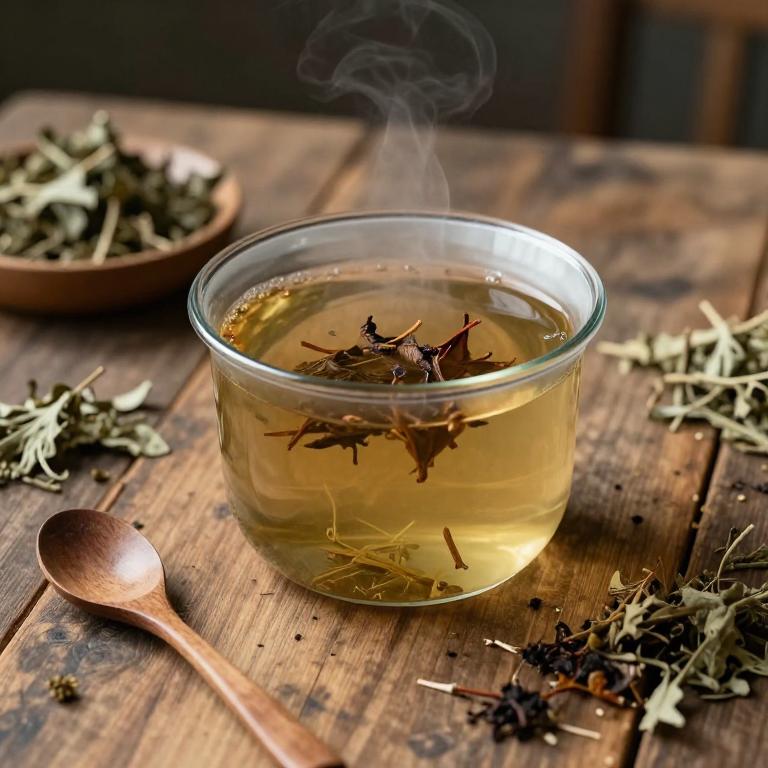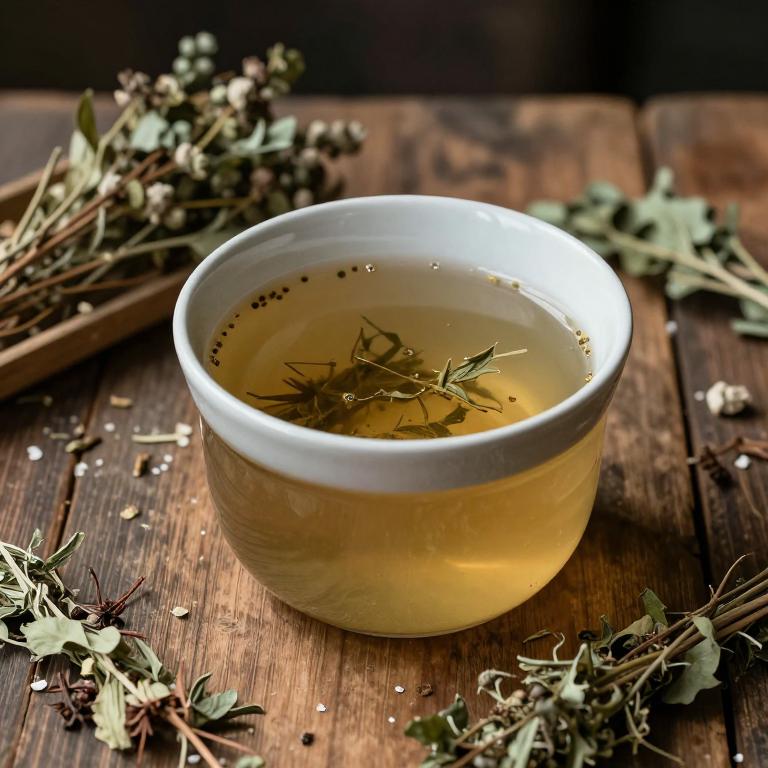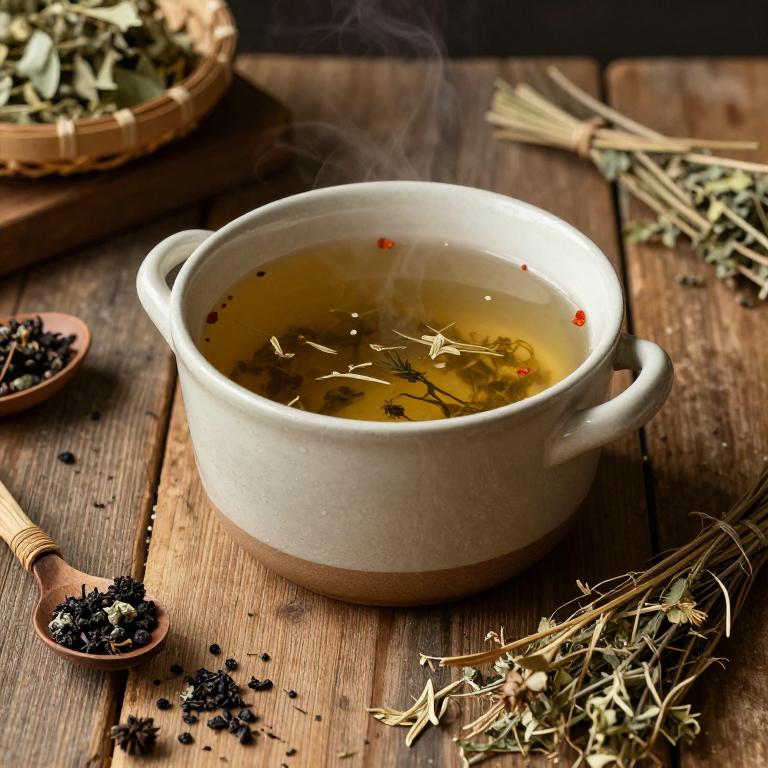10 Best Herbal Decoctions For Cold Sore

Herbal decoctions have been traditionally used to alleviate symptoms and promote healing in cold sores, which are caused by the herpes simplex virus.
Common herbs such as echinacea, goldenseal, and licorice root are often included in these decoctions due to their antiviral, anti-inflammatory, and soothing properties. To prepare a decoction, these herbs are typically simmered in water for an extended period to extract their active compounds. Applying the cooled liquid topically can help reduce redness, swelling, and discomfort associated with cold sores.
While herbal decoctions may offer some relief, they should not replace professional medical advice, especially for severe or persistent outbreaks.
Table of Contents
- 1. Ginger (Zingiber officinale)
- 2. St. john's wort (Hypericum perforatum)
- 3. Echinacea (Echinacea purpurea)
- 4. Stinging nettle (Urtica dioica)
- 5. Aloe vera (Aloe barbadensis)
- 6. Chaste tree (Vitex agnus-castus)
- 7. Marigold (Calendula officinalis)
- 8. English lavender (Lavandula angustifolia)
- 9. Camellia (Camellia sinensis)
- 10. Black elderberry (Sambucus nigra)
1. Ginger (Zingiber officinale)

Zingiber officinale, commonly known as ginger, has been traditionally used in herbal medicine for its anti-inflammatory and antiviral properties, which may help in the treatment of cold sores.
When prepared as a herbal decoction, ginger can be applied topically to reduce the pain, swelling, and duration of cold sore outbreaks. The active compounds in ginger, such as gingerol and shogaol, are believed to inhibit the replication of the herpes simplex virus. To prepare the decoction, fresh ginger root is boiled in water for several minutes, then cooled and strained before application.
While ginger may offer some symptomatic relief, it is advisable to consult a healthcare professional for persistent or severe cold sore cases.
2. St. john's wort (Hypericum perforatum)

Hypericum perforatum, commonly known as St. John's wort, is often used in herbal decoctions to address cold sores caused by the herpes simplex virus.
The preparation involves simmering the dried plant material in water to extract its active compounds, such as hypericin and hyperforin, which are believed to have antiviral and anti-inflammatory properties. When applied topically, the decoction may help reduce the duration and severity of cold sore outbreaks by inhibiting viral replication and soothing the affected area. However, it is important to note that while some studies suggest potential benefits, more research is needed to confirm its efficacy for this specific use.
Individuals should consult with a healthcare provider before using St. John's wort, as it can interact with certain medications and may not be suitable for everyone.
3. Echinacea (Echinacea purpurea)

Echinacea purpurea, commonly known as purple coneflower, is a popular herbal remedy often used to support the immune system and potentially reduce the frequency and severity of cold sores.
Herbal decoctions made from Echinacea purpurea typically involve simmering the dried root or herb in water to extract its active compounds, such as alkamides, caffeic acid derivatives, and polysaccharides. Some studies suggest that these compounds may have antiviral properties that could help combat the herpes simplex virus, which is responsible for cold sores. However, while anecdotal evidence supports its use, scientific research on its effectiveness for cold sores remains limited and inconclusive.
As with any herbal remedy, it is advisable to consult a healthcare professional before use, especially for individuals with allergies or those taking other medications.
4. Stinging nettle (Urtica dioica)

Urtica dioica, commonly known as stinging nettle, has been traditionally used in herbal medicine for its anti-inflammatory and antiviral properties.
A decoction made from the leaves and stems of Urtica dioica can be prepared by simmering the dried plant material in water for several minutes. This herbal decoction is believed to support the body's immune response and may help reduce the duration and severity of cold sores caused by the herpes simplex virus. Some studies suggest that the compounds in stinging nettle, such as flavonoids and minerals, may have antiviral effects.
However, it is important to consult a healthcare professional before using Urtica dioica decoctions, especially for individuals with allergies or those taking other medications.
5. Aloe vera (Aloe barbadensis)

Aloe barbadensis, commonly known as aloe vera, has been traditionally used for its soothing and healing properties, and its herbal decoctions may offer relief for cold sores.
When prepared as a decoction, aloe vera can be applied topically to the affected area to reduce inflammation and promote faster healing. The gel or liquid extracted from the aloe plant contains compounds like polysaccharides and antioxidants that may help combat the herpes simplex virus. While some studies suggest potential antiviral effects, more research is needed to confirm its efficacy for cold sores.
It is often recommended to use aloe vera in combination with other treatments under the guidance of a healthcare professional.
6. Chaste tree (Vitex agnus-castus)

Vitex agnus-castus, commonly known as chasteberry, has been traditionally used in herbal medicine for various health conditions, including hormonal imbalances and skin issues.
While it is not a primary treatment for cold sores, some studies suggest that its anti-inflammatory and antiviral properties may help reduce the severity and duration of outbreaks. Herbal decoctions made from vitex agnus-castus are often prepared by simmering the dried berries in water, and may be consumed as a tea or applied topically to the affected area. However, it is important to consult with a healthcare provider before using vitex for cold sores, as it may interact with certain medications or have side effects in some individuals.
Overall, while vitex agnus-castus may offer supportive benefits, it should not replace conventional treatments for cold sores.
7. Marigold (Calendula officinalis)

Calendula officinalis, commonly known as garden marigold, has been traditionally used in herbal medicine for its anti-inflammatory and antiviral properties.
Herbal decoctions made from calendula flowers are often employed to soothe and heal cold sores, which are caused by the herpes simplex virus. The decoction is typically prepared by simmering dried calendula petals in water to extract their active compounds, which can then be applied topically to the affected area. While calendula may help reduce redness, swelling, and discomfort associated with cold sores, it is not a cure for the viral infection itself.
It is advisable to consult a healthcare professional for proper treatment, especially if symptoms persist or worsen.
8. English lavender (Lavandula angustifolia)

Lavandula angustifolia, commonly known as English lavender, has been traditionally used in herbal medicine for its calming and antiviral properties.
Herbal decoctions made from lavender are believed to help alleviate symptoms associated with cold sores, such as pain and inflammation. The essential oils in lavender, particularly linalool and linalyl acetate, possess antimicrobial and anti-inflammatory effects that may inhibit the replication of the herpes simplex virus. To prepare a lavender decoction, dried lavender flowers are simmered in water for several minutes, then cooled and applied topically to the affected area.
While some studies suggest potential benefits, more clinical research is needed to fully confirm its efficacy in treating cold sores.
9. Camellia (Camellia sinensis)

Camellia sinensis, commonly known as the tea plant, is the source of various herbal decoctions that have been traditionally used for their therapeutic properties.
While not a direct treatment for cold sores, some decoctions made from Camellia sinensis leaves may offer supportive benefits due to their antioxidant and anti-inflammatory compounds. These decoctions are often prepared by boiling the leaves in water to extract bioactive components such as polyphenols and caffeine. However, scientific evidence specifically linking Camellia sinensis decoctions to the treatment of cold sores is limited, and they should not replace proven medical treatments.
It is advisable to consult a healthcare professional before using any herbal remedy for cold sores.
10. Black elderberry (Sambucus nigra)

Sambucus nigra, commonly known as the European elderberry, has been traditionally used in herbal medicine for its potential antiviral and immune-boosting properties.
When prepared as a decoction, the berries are simmered in water to extract their active compounds, including flavonoids and anthocyanins, which may help reduce the duration and severity of cold sores caused by the herpes simplex virus. Some studies suggest that elderberry decoctions may inhibit viral replication and support the body's immune response, making them a popular complementary remedy for cold sore management. However, it is important to note that while elderberry is generally considered safe, it should be used with caution, especially in individuals with autoimmune conditions or those taking certain medications.
As with any herbal remedy, it is advisable to consult a healthcare professional before use, particularly for those with existing health conditions or who are pregnant.